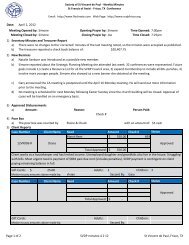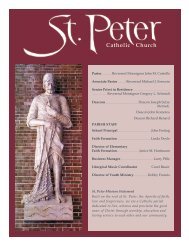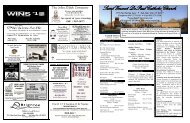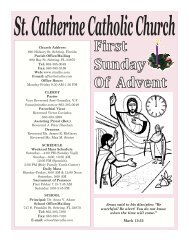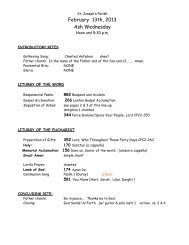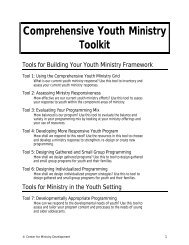You also want an ePaper? Increase the reach of your titles
YUMPU automatically turns print PDFs into web optimized ePapers that Google loves.
The <strong>Angelus</strong> MAY <strong>2013</strong> Page 5<br />
<strong>May</strong> Study Question<br />
Although Blessed John Paul II did not develop<br />
a full theological scheme of the New<br />
Evangelization, his writings reveal central<br />
themes of the New Evangelization, including<br />
the implementation of the call of the Second<br />
Vatican Council to proclaim the Good News of<br />
Christ by the engagement of the present culture<br />
and to accompany individuals on their journey<br />
from this life to eternal life. (Disciples Called to<br />
Witness p.6) He clarified that the New<br />
Evangelization is new, not in its content but<br />
rather in its inner thrust; new in its methods that<br />
must correspond to the times; and new<br />
because it is necessary to proclaim the Gospel<br />
to those who have already heard it.<br />
Study Question: Are there faith formation programs<br />
on how to pass down the faith for parents,<br />
grandparents, godparents? Are there faith<br />
formation programs for adolescents and young<br />
adults on how to share their faith with others in<br />
college and the workplace?<br />
Vatican II: A bit of controversy arises<br />
Fr. Rev. Joseph Uecker, C.PP.S.<br />
When the bishops entered St. Peter’s<br />
on October 16, 1963, they did not<br />
receive the promised ballot. After Mass,<br />
Cardinal Agagianian announced without<br />
explanation that the scheduled vote had<br />
been postponed “to another day.” Word<br />
soon spread that Cicognani, acting in the<br />
pope’s name had the previous evening<br />
ordered the ballots, already printed, to<br />
be burned. The bishops were stunned.<br />
Conspiracy! Treachery! Such were the<br />
words heard inside and outside the<br />
assembly. Someone had obviously gotten<br />
to Pope Paul.<br />
On October 28, 1963 Cardinal<br />
Suenens announced to the Council that<br />
the pope had approved the voting which<br />
would take place in two days. The voting<br />
took place and the results were:<br />
1. Should the schema assert that episcopal<br />
consecration is the supreme grade<br />
of the sacrament of orders? 2,123 to 34.<br />
2. Should the schema assert that every<br />
legitimately consecrated bishop in communion<br />
with the other bishops and the<br />
Roman Pontiff is a member of the Body<br />
of Bishops? 2,154 to 104<br />
3. Should the schema assert that the<br />
so-called Body or College of Bishops in<br />
its evangelizing, sanctifying, and governing<br />
task is successor to the original<br />
College of the Apostles and, always in<br />
communion with the Roman Pontiff,<br />
enjoys full and supreme power over the<br />
universal Church? 2,148 to 336.<br />
4. Should the schema assert that the<br />
aforementioned power of the College of<br />
Pope Paul VI presides over a<br />
meeting of the Second<br />
Vatican Council in St. Peter's<br />
Basilica at the Vatican in this<br />
undated photo. Pope<br />
Benedict XVI will mark the<br />
50th anniversary of the Oct.<br />
11, 1962 opening of the<br />
council and kick off the Year<br />
of Faith with an Oct. 11 Mass<br />
in St. Peter's Square. (CNS<br />
photo/Giancarlo Giuliani,<br />
Catholic Press Photo)<br />
Bishops, united with their head, belongs<br />
to it by divine ordinance and therefore<br />
not by papal delegation? 2,138 to 408<br />
5. Should the schema assert that it is<br />
opportune to consider the reinstatement<br />
of the diaconate as a permanent grade of<br />
(Please See VATICAN/22)<br />
Vaticano II: El Segundo Período (1963), parte 3<br />
Rev. Joseph Uecker, C.PP.S.<br />
Cuando los obispos entraron en la<br />
Basílica de S. Pedro el 16 de octubre de<br />
1963, no recibieron la papeleta prometida.<br />
Después de la misa, el Cardenal<br />
Agagianian anunció sin explicación que<br />
la votación planeada iba a ocurrir “otro<br />
día.” Pronto se propagó que Cicognani,<br />
actuando en el nombre del papa había<br />
ordenado, la tarde anterior, que las<br />
papeletas fueran quemadas. Los obispos<br />
estaban paralizados de susto.<br />
¡Conspiración, traición! Tales palabras se<br />
escuchaban dentro y fuera de la asamblea.<br />
Evidentemente alguien había hablado<br />
con el papa.<br />
El 28 de octubre de 1963 el Cardenal<br />
Suenens anunció al Concilio que el papa<br />
había aprobado la votación que iba a<br />
ocurrir en dos días. La votación ocurrió y<br />
los resultados fueron:<br />
1. ¿El esquema debe declarar que la<br />
consagración episcopal es el grado supremo<br />
del sacramento de las sagradas<br />
ordenes? 2,123 a 34 en favor.<br />
2. ¿El esquema debe declarar que cada<br />
obispo legítimamente consagrado en<br />
comunión con los otros obispos y el<br />
Obispo de Roma es miembro del Cuerpo<br />
de Obispos? 2,154 a 104.<br />
3. ¿El esquema debe declarar que el<br />
“Cuerpo o Colegio de Obispos” en su<br />
trabajo de evangelizar, santificar y gobernar<br />
es sucesor del Colegio original de<br />
los Apóstoles y, siempre en comunión<br />
con el Obispo de Roma, posee poder<br />
supremo y completo sobre la Iglesia universal?<br />
2,146 a 36<br />
4. ¿El esquema debe declarar que el<br />
poder mencionado del Colegio de<br />
Obispos, unido con su cabeza, es suyo<br />
por la ley divina y por eso no por delegación<br />
del papa? 2,138 a 408<br />
5. ¿El esquema debe declarar que es<br />
oportuno considerar el restablecimiento<br />
del diaconado como grado permanente<br />
del ministerio sagrado, según las necesidades<br />
en diferentes partes de la Iglesia?<br />
2,120 a 525.<br />
Cuando uno considera estos votos, es<br />
difícil entender qué era el problema actual.<br />
Había acuerdo sobre los principios de<br />
unos asuntos críticos y controversiales.<br />
Entre esos asuntos, la colegialidad era<br />
especial. Los obispos, por su presencia<br />
en el Concilio y su participación activa<br />
en él, estaban experimentando actualmente<br />
la colegialidad. Para ellos era<br />
ahora parte de su realidad vivida. En<br />
principio, la colegialidad había llegado a<br />
una estatura segura y central como la<br />
manera en que la Iglesia funciona – o<br />
debe funcionar<br />
Este voto, sin embargo, era muy difícil<br />
para la minoridad. Ellos oponían la colegialidad<br />
y eran casi 20% en este asunto<br />
particular. Y esto dejó bastante lugar para<br />
maniobrar.<br />
Aunque hay mucho que no sabemos,<br />
parece que el asunto procedimental bajo<br />
todos los asuntos procedimentales era el<br />
papel del papa mismo. Recuerden que<br />
dijimos que por la mayoría de los concilios,<br />
el papa ni siquiera estaba presente.<br />
Tal vez estamos sabiendo el por qué y<br />
que era bueno que el papa no estuviera<br />
presente.<br />
Mientras tanto, el esquema Sobre la<br />
Iglesia se consideraba en el Concilio.<br />
Comenzaron el capítulo 3: Sobre el<br />
Pueblo de Dios, y Especialmente los<br />
Laicos. Hubo una frase larga que resume<br />
el pensamiento: “Los pastores fueron<br />
instituidos en la Iglesia, no para que<br />
aceptaran toda la carga de edificar el<br />
Cuerpo Místico de Cristo, sino para que<br />
pudieran alimentar y gobernar a los fieles<br />
de una manera que resultara en la cooperación<br />
de todos en completar el trabajo<br />
común.” Esta es una reconciliación entre<br />
las dimensiones horizontal y vertical en<br />
la Iglesia.<br />
Había muchas quejas cuando se habló<br />
del sacerdocio de los bautizados. Para<br />
algunos, parecía ser otra concesión a los<br />
observadores Protestantes, porque todos<br />
sabían que Martín Luther hablaba en<br />
favor del sacerdocio de todos los<br />
creyentes. El Cardenal Siri pidió directamente<br />
que la alabanza para los laicos<br />
fuera menos. Animar es una cosa buena,<br />
pero no debe haber demasiado.<br />
El Cardenal Suenens habló de los<br />
carisma en la Iglesia, pidiendo que el<br />
capítulo sea aún más desarrollado para<br />
(Mira VATICANO/23)





